In this bi-weekly series reviewing classic science fiction and fantasy books, Alan Brown looks at the front lines and frontiers of the field; books about soldiers and spacers, scientists and engineers, explorers and adventurers. Stories full of what Shakespeare used to refer to as “alarums and excursions”: battles, chases, clashes, and the stuff of excitement.
Robert Heinlein never shied away from putting the protagonists of his juvenile novels into nasty situations, and Farmer in the Sky is no exception. The solar system is on the verge of a Malthusian disaster, with the human population rapidly outstripping food supplies. Though surrounded by material riches previous generations would no doubt envy, people are counting every calorie and living on the edge of hunger. Even the staggering cost of transforming hostile worlds into farmland is not too steep if it will help stave off the inevitable. Young Bill Lerner volunteers to become a pioneer farmer on the Jovian moon of Ganymede, and to grow into adulthood on the far-off frontier.
This is one of the Heinlein juveniles I didn’t get around to reading when I was young. I suspect it was because I thought going to work on a farm seemed like a terrible waste of a journey through space. But toward the end of my career, I was working an hour away from home, and Farmer in the Sky was one of the books I picked up in audio version to help pass the commute. The discs were from Brilliance Audio, and the reader, Nick Podehl, did an excellent job. It even had nice cover art, which (while it was not credited) looked like the work of Bob Eggleton. It is difficult to write a review from an audiobook, though, so I borrowed a print copy from my son (being in a multigenerational family of science fiction geeks can come in handy). His copy was a 1988 paperback reprint from Ballantine Books, marred by a perfunctory cover illustration and cover copy that seemed like a first draft mockup.
I probably would have read the book sooner if I had known the protagonist was a Boy Scout, as I am also part of a multi-generational Scouting family. An abridged version of Farmer in the Sky originally appeared in Boy’s Life magazine in 1950 as “Satellite Scout,” and Bill’s experience as a Boy Scout is a major element of the plot. Like Bill in the book, I’ve found that the skills and values I’d learned in the Boy Scouts to be useful in adulthood. To address the elephant in the room, however, I am absolutely appalled at how the leadership of the Boy Scouts betrayed the values they were teaching as they hid evidence of sexual abuse over the years. While I would be happy to discuss the role of Scouting in Heinlein’s fiction in the comments after this review, I would ask we not turn it into a discussion of behavior we all agree is reprehensible.
Over the years, Boy’s Life featured quite a bit of what is now called YA fiction, and a fair amount of that was science fiction (as summarized in this article in the Encyclopedia of Science Fiction). This included other works from Robert Heinlein, including two short stories: “Nothing Ever Happens on the Moon,” and “Tenderfoot in Space.” An abridged version of The Rolling Stones appeared as “Tramp Space Ship,” and there was even a comic strip adaptation of Between Planets.
About the Author
Robert A. Heinlein (1907-1988) was one of America’s best known science fiction authors, frequently referred to as the Dean of Science Fiction. I have regularly discussed his work in this column, including Starship Troopers, The Moon is a Harsh Mistress, “Destination Moon” (contained in the collection Three Times Infinity), The Pursuit of the Pankera/The Number of the Beast, and Glory Road. From 1947 to 1958, he also wrote a series of a dozen juvenile novels for Charles Scribner’s Sons, a firm interested in publishing science fiction novels targeted at young boys. These novels include a wide variety of tales, and contain some of Heinlein’s best work (the books I’ve already reviewed in this column are underlined, and have links to the review): Rocket Ship Galileo, Space Cadet, Red Planet, Farmer in the Sky, Between Planets, The Rolling Stones, Starman Jones, The Star Beast, Tunnel in the Sky, Time for the Stars, Citizen of the Galaxy, and Have Spacesuit Will Travel. This is not the first time Farmer in the Sky has been reviewed on Tor.com, as the inimitable Jo Walton looked at it over a decade ago.
Starvation and Terraforming
The pioneering English economist Thomas Robert Malthus (1766-1834) posited a theory that human populations would inevitably grow past available food supplies, and catastrophe would result, with wars, famine, and disease bringing the populations back down. His views were both controversial and highly influential, and are still debated in the modern era.
The idea of a Malthusian collapse runs through many of Robert Heinlein’s works, but never so directly as in Farmer in the Sky. Heinlein’s solution to the trap Malthus predicted was rooted in the American experience of the eighteenth through early twentieth centuries and the idea of avoiding collapse by expanding into new frontiers. His works envision humanity moving throughout the solar system and taking action to make its worlds more habitable, from building atmosphere plants on Mars to the audacious project of transforming the moons of the outer planets into habitable worlds.
Heinlein put a lot of thought into what would make Ganymede a viable option for human life. Heating the world to Earth-normal conditions would require a lot of heat, using “mass energy converters” that put our current atomic power plants to shame. He estimated it would take fifty years to break enough of the surface ice down into hydrogen and oxygen to produce an atmosphere that, while thinner than Earth’s, would have a partial pressure of oxygen sufficient for breathing. And the atmosphere would be kept cloudy by a ‘heat trap’ to maximize the greenhouse effect. The moon’s rock would be broken down into sterile soil that could be seeded with earth microbes and turned into arable land.
Heinlein’s vision was unfortunately more than a bit overoptimistic, given what we have learned about the outer planets and their moons thanks to the robotic probes employed in the latter half of the 20th century. One of the biggest problems is radiation. While Ganymede is one of the rare moons with a magnetosphere, it is not up to the challenge of protecting its surface from the radiation and energetic particles generated by Jupiter. Early settlers would have to live underground. Moreover, there is a lot more water on Ganymede than Heinlein imagined—enough that heating the planet to Earth-normal temperatures would create a world covered by a deep ocean, with powerful tides and currents generated by Jupiter and its moons.
That might be an interesting setting for science fiction stories, but is far different than the world Heinlein described. In any event, without power plants that directly convert matter to energy, the power to heat a world to the extent needed will remain beyond human capabilities. And I suspect that any project of this scale, because major endeavors always end up being more difficult than they look in theory, would not be the work of mere decades (as they are in Heinlein’s stories) but of centuries. I freely admit, however, that I am not an astronomer, engineer, or scientist, and would welcome the input of anyone who understands such subjects better than I do.
Farmer in the Sky
Bill Lerner is an angry young man, perhaps the angriest protagonist of any in Heinlein’s juveniles. His mother, Anne, recently died, and he is not coping well. It doesn’t help that his dad, George, is one of those absentminded people who, while good at his work and career, struggles to cope with the challenges of day-to-day life. Thus, Bill has stepped into the caregiver role. They live a comfortable life, although hunger is always an issue on the overcrowded Earth of the future.
Then, out of the blue, George announces he wants to emigrate to Ganymede…and leave Bill behind. Bill convinces his father that they should go together, and Heinlein takes some time describing the process used to screen potential candidates for emigration. Next, Bill’s dad reveals he is marrying Molly, a widow who works in his office. Molly has a daughter, Peggy, so Bill is now stuck with a kid sister he didn’t want. Bill feels that his dad has betrayed his mother’s memory, skips the wedding, and doesn’t see his father and new family until launch day.
Bill decides at the last minute to bring his Scout uniform shirt, and since his luggage is at the weight limit, puts it on under his other clothes. Since he hasn’t been eating well lately, he still manages to squeak in just under the weight limit. He flies to orbit in a shuttle named Bifrost, and meets an entitled kid named Hank Jones, who fast-talks their way into the ship’s control center. They meet the captain, who jokes about his career being derailed when pirates kidnapped him—Bill later finds out from his father that the story was true. Along the way, Heinlein fills the reader in on the details of spaceflight.
They then transfer to Mayflower, the atomic rocket that will take them to Ganymede; because of the radioactivity of the ship’s power plant, she will never actually land on a planet. While Heinlein doesn’t dwell on it, we see that Bill begins to heal the relationship with his father and new family. He also befriends the Chief Engineer, Mr. Ortega, who spends a lot of time explaining to Bill (and also the reader) the operations of an atomic passenger ship. Bill also gets the idea of starting up Scout troops on the ship, an idea popular with adults, as there is far too much time on everyone’s hands during their months-long journey (his stepsister Peggy joins a Girl Scout troop). Bill becomes a hero when a meteorite punches a hole in his dormitory room, and he ingeniously stuffs his Boy Scout shirt to plug the breach.
The colonists transfer to the colony’s single orbital shuttle, Jitterbug (and I was shocked by the lack of redundancy that represented). When they finally disembark, they find living conditions abysmal, as the colony is overwhelmed by the number of colonists. Instead of being offered finished farms, they are offered plots of unimproved rock, and in order to eat until they can get their own farms going, they must hire themselves out as sharecroppers to established farmers. Bill finds there are Boy Scouts on Ganymede, but to his chagrin, they insist that newly arrived Scouts must start over to re-earn all their ranks and badges. As an engineer, Bill’s dad is offered an office job in town. Peggy turns out to be unable to adapt to the thin atmosphere, and must live in a special pressurized room, tying Molly to her constant care. So Bill sets out to start their farm on his own.
Buy the Book
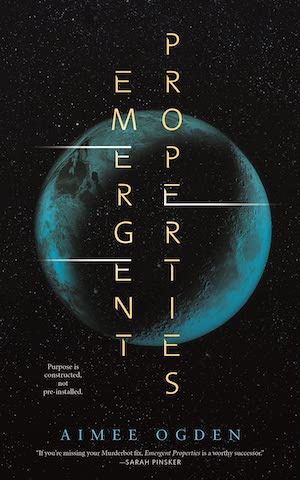

Emergent Properties
Here Heinlein gets to expound at great length about how Ganymede has been reshaped into a habitable environment, and how raw rock is turned into farms. Fortunately, their farm is near the established farm of the Schultz family, who prove to be the best possible neighbors, helping Bill get the land processed and giving him advice and assistance. Poppa Schultz has an apple tree he planted upon arrival, and is considered eccentric because he hands out apples like they are valuable treasures (which in the long run, they truly are). Theirs is a large family, with lots of kids, and one of them is a daughter named Gretchen. This being a Heinlein juvenile, the fact that Bill is attracted to her is never discussed in any detail, but he does tease her about her red hair, and when considering returning to Earth later in the book to continue his education, muses that no Earth girls could ever measure up to Gretchen. These clues are enough for readers to imagine that Bill may end up marrying Gretchen sometime in the future.
Their soil eventually gets processed, and Bill builds a stone house the family can move into (with Peggy still needing a pressurized room). And then disaster strikes the colony. There is a rare alignment of Jupiter’s moons (as it turns out, an impossible alignment, a somewhat rare scientific mistake on Heinlein’s part), and the tidal forces create a gigantic earthquake. This takes the power plant that runs the heat trap offline, and the temperatures begin to plunge to Ganymede’s normal temperatures, far below zero (the fact there is only a single heat trap keeping the moon habitable strikes me as a criminally negligent lack of redundancy). Bill and his family make it back into town where there are still a few heated buildings, but their house is destroyed by the earthquake and their crops frozen. Peggy, already frail, dies during their journey to town. The Schultz family survives on their farm by chopping down Poppa’s precious apple tree and burning it in their fireplace to keep warm.
After the heat trap is brought back online and normal conditions restored, Bill and his father get the farm back on track, and then Bill volunteers to work on a survey team looking at unexplored parts of the moon. There are some discussions of the coming Malthusian disaster with the team leader, where Heinlein lays out his ideas on the subject in explicit detail. But then, saving the narrative from this depressing turn, Bill and a friend (Hank Jones, who he met way back on Bifrost) discover a cache of devices left by an alien civilization, which causes quite a stir.
The book ends as George tries to convince Bill to return home to Earth to continue his education, but Bill realizes he doesn’t need to attend a school to learn, and decides he is already home.
Final Thoughts
Farmer in the Sky ends up being one of the better of Heinlein’s juveniles. Bill’s growth from an angry and selfish teenager into a mature adult is realistic and satisfying. The description of the various stages of the trip to Ganymede, and the details of its terraforming, might be dull in other hands, but Heinlein does a great job bringing the expository details to life. There are some aspects of the story that stretch credulity, but it’s always interesting, and in the end, quite emotionally satisfying.
Now, I turn the floor over to you. If you’ve read Farmer in the Sky, I’d enjoy hearing your thoughts. And also any thoughts you might have on atomic rockets, terraforming, or any of the other topics raised in the story.
Alan Brown has been a science fiction fan for over five decades, especially fiction that deals with science, military matters, exploration and adventure.











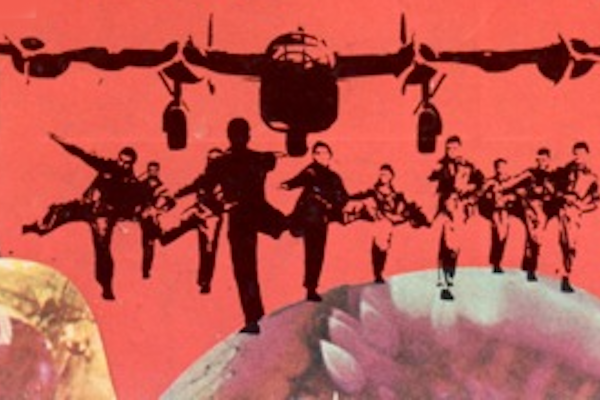
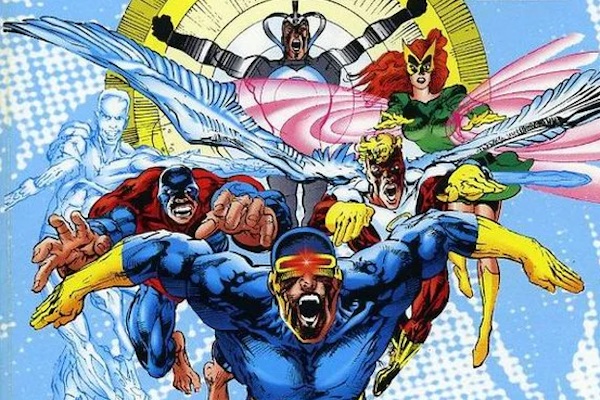
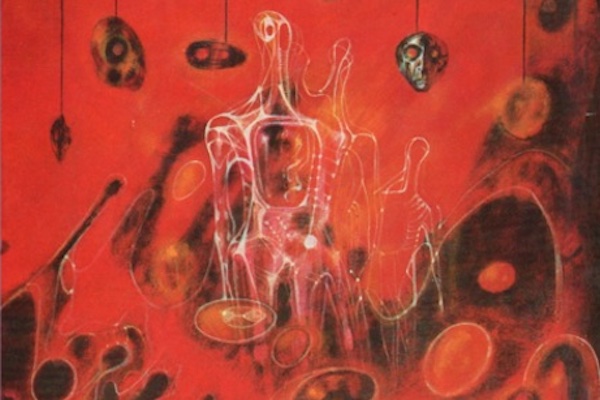
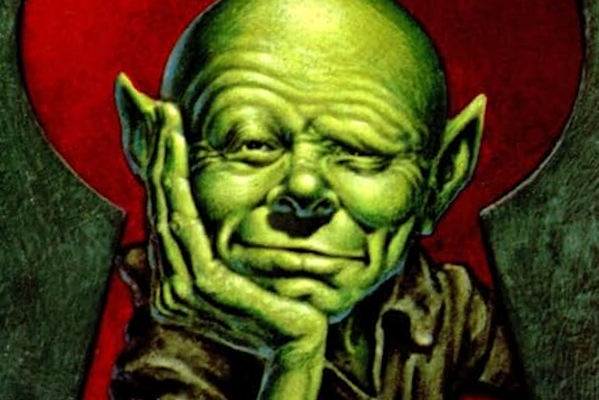
I would have read this story when I first discovered science fiction—perhaps around 1960/61? In any case, I was still young enough that I knew nothing about any of its issues or facts, and found Heinlein’s explanations fascinating. I would have eaten it all up, without ever noticing any plot coincidences or inconsistencies. I do not remember anything particular about it, however, even though some of his juveniles remain very clearly imprinted on my brain from that time. All I know is that I *did* read it!
Re Peggy’s death: it’s worth knowing that Heinlein lost his sister, Rose, when he was a teenager.
I remember reading this one multiple times, as there wasn’t much SF available (especially in YA) when I started reading. I’d forgotten the bad planning you point to; Heinlein may have thought the economy wouldn’t support redundancy, or may not have cared about that level of detail in YA, or may just not have thought. Add to your points that a single apple tree would not produce fruit, which requires cross-pollination (says memory buttressed by Wikipedia); I also question how much heat they’d get from a freshly-cut deciduous tree — my impression is that non-resinous wood needs to dry to be worth burning.
As in this book, there’s a wise German-descended pater in “Waldo”; can anyone think of others? Heinlein grew up a long way from “Pennsylvania-Dutch” country (even allowing that that includes some of eastern Ohio); I wonder whether he knew rural German-descended people despite growing up mostly in the city.
I too remember Farmer in the Sky as one of my favorites of the Heinlein juveniles when I read them back in the Sixties. As a side note, I’ve always wondered why no one seemed to notice that the character of Praxideke Meng on The Expanse is in essence a farmer, on Ganymede.
I liked just about all the Heinlein juveniles and this one more than most of them BUT where did that ending come from? They rescue Bill with an alien machine? Sounds like literal deus ex machina to me :) Doubly convenient that Bill is out of it with fever and doesn’t remember much of it.
But the sense of reality he created about the terraforming process out on Ganymede was just (chef’s kiss).
There’s a big transformation you glossed over.
Initially Bill detests Peggy, but he slowly comes around, and when she dies, he is absolutely devastated, and even prays, something which as far as I remember doesn’t happen in any other Heinlein (thank God).
Even when I first read this, when I was very young, I had some doubts about the economics of shipping food almost a billion kilometers, and now it’s obviously silly, but it doesn’t make a difference – it’s a page turner.
Heinlein’s theory for juveniles was (paraphrased) to take a good idea, remove all the sex and nearly all the violence, and then write the best book he could, and this is a great example.
Peggy being unable to adapt to Ganymede and becoming ill – disabled, although Heinlein doesn’t use that term and might not have thought of it that way – and then dying, is dealt with at length and head-on in a way that’s rare in Heinlein juveniles. Farmer In The Sky is a very personal and human book in that way, for all the exposition about atomic rockets and terraforming.
The scene Tom Ritchford mentions, where after working non-stop for days to try to save as much of his own and his neighbours’ farms as he can from the disaster, Bill finally breaks down and grieves for Peggy, is to me one of the most moving things Heinlein ever wrote. I’m not sure I’d describe what he does as praying – if I’m remembering correctly, he asks his beloved dead mother to take care of Peggy – but it certainly comes very close.
While things turned out okay, fifteen years after Farmer was published Virginia Heinlein’s chronic altitude sickness forced her and Robert to leave their beloved house in Colorado Springs and move to lower-lying Bonny Doon, California.
@2 I had not realized Heinlein lost his own sister at a young age. That not only informs my understanding of the death in this book, it also changes the way I think about Heinlein’s decision to (SPOILER AHEAD) kill off main character Podkayne in his first draft of Podkayne of Mars.
@3 You are right about apple trees, I was recently thinking I had to buy at least two when I was looking at apple trees for my yard. But for whatever reason, I didn’t think of it in relationship to the book. And your comment about firewood is valid as well. One tree’s worth of green wood would have had problems heating a home in a normal winter night, let alone on a night a couple of hundred degrees below zero. We will just have to chalk that up to artistic license and move on. Regarding German characters, Heinlein came from German ancestors himself, and there are German-descended farmers all through the Midwest. So it is not hard to imagine him coming across someone who inspired Poppa Schultz.
@5 There were mysterious alien discoveries in a number of Heinlein’s juveniles. Rocket Ship Galileo had not just Nazis on the moon, but Nazis sheltering in the abandoned ruins of an alien outpost. Space Cadet gave us the information the Asteroid Belt was the remains of an exploded fifth planet, which may have been destroyed by its inhabitants in an atomic war. And Farmer in the Sky gave us the cache of mysterious alien artifacts. Those elements always came out of the blue, not as much a plot twist as an extra dollop of spice.
@6 and @7 I agree, Bill moving past his grief and learning to love his new family was one of the best parts of the book.
Malthusian collapses are a feature in Tunnel in the Sky – the Chinese Empire has conquered and irrigated Australia but that still isn’t enough to accommodate its growing population, so it’s forcibly shipping them overseas through the gates in huge numbers.
(In the real world the Chinese population peaked last year; their biggest problem in the future is probably going to be caring for their elderly with a shrinking population of working-age adults.)
@10: this was written back when the myth of the marching Chinese was so unquestioned that Heinlein may not have bothered checking the math — or he might not have believed that even a totalitarian government could take the steps the PRC took in the late 20th century. (The idea that women with more choice and education would choose to bear fewer children would have seemed unbelievable to him.)
@0/@5: I remember thinking on first reading A Million Open Doors that the almost-end felt like a blatant tribute to the end of this book; the fact that AFAICR none of the other Thousand Cultures found high-tech alien artifacts suggests Barnes just threw this in for show.
The idea that women with more choice and education would choose to bear fewer children would have seemed unbelievable to him.
I doubt this, frankly. Birth rates had been falling in most advanced countries for decades by the time Heinlein was writing. The issue of educated women having fewer children by choice was a major complaint of the eugenics movement, which thought of course that they should be having more, to improve the race. (Bertie Wooster’s terrible Aunt Agatha tells him this in a story written in the 1920s. Why precisely the perpetuation of the Wooster genome should be considered a net gain for the gene pool of the British Empire is never made clear.)
Heinlein was one of seven children when he was born in 1907. By 1950 the average American family had just 3.2 children.
I think Heinlein would have been surprised, however, that a Chinese government would deliberately try to reduce population growth. At the time of writing, China was ruled by Maoist Communists, who had a drown-it-in-bodies approach to virtually every policy question, from improving agricultural yield to fighting the Korean War. Mao himself, who was a monster, was fond of saying that China could survive a nuclear war simply because its population was so huge that it could take hundreds of millions of civilian casualties and keep fighting, and then breed back the shortfall afterwards.
Nor, looking at 1950s China, would it have been easy to predict that it would become a low-fertility urban industrial economy so quickly. As late as 1968 the average Chinese woman had 6.3 children.
Okay, here are a couple of quotes from Tunnel in the Sky which look relevant. This is from chapter 1, “The Marching Hordes”:
And this is from Caroline’s diary in chapter 11, written at a point when Rod and Roy had failed to return from their exploring expedition:
I don’t have a copy of Farmer in the Sky, so I can’t check to see if there is a similar prayer in it.
@13: Good point — I’d forgotten that.
@12: Heinlein had an assortment of blind spots; I draw my argument about his not seeing that particular choice of women from what I see in his works. The question wrt family sizes is how many of those 7 and 3.2 survived; my father (b1898) opined that the family of his father (b1859) was typical of its time, with 4 of 11 children dying young and 1 in the Civil War. I think RAH would have been baffled at the idea of women not continuing to have children at well above the replacement rate; IIRC, that might have been barely discernible in right-up-to-the-minute statistics in his last years.
@14 – I’d agree with you about Heinlein’s female characters’ attitudes towards breeding. It seems that the typical Heinlein female protagonist is ready to begin limbering up to have children as soon as she snags a suitable man, while at the same time being as competent and self-reliant as any man.
It probably isn’t fair to Heinlein to try to imagine his motivations about something potentially so personal, but I wonder if this isn’t related to the Heinleins’ apparent inability to have children of their own.
I’ve consulted the Patterson biography for details on the death of Heinlein’s sister. Rose Elizabeth Heinlein was killed by an auto accident in May 1926, when she was seven years old and Robert was eighteen. It was his plebe year at Annapolis; his older brother Ivar was also at Annapolis then. They were given emergency leave and rushed home; she was still alive but in critical condition. She recognized Robert and spoke to him, but died soon afterward. Although he had numerous siblings, she had been his favorite. The brothers had to return to Annapolis almost immediately and didn’t really have a proper chance to mourn her.
Rod had heard an old story which asserted that if all the Chinese on Terra were marched four abreast past a given point the column would never pass that point, as more Chinese would be born fast enough to replace those who had marched past. Rod had taken his slide rule and applied arithmetic to check it—to find, of course, that the story was nonsense; even if one ignored deaths, while counting all births, the last Chinese would pass the reviewing stand in less than four years
Marching troops move at 98 yards per minute and you need 3 yards separation between ranks at least so every minute 131 Chinese people will march past this point – (98/3) * 4. That makes 68.7 million passing the fixed point per year. Last year there were 9.5 million births in China. Back when Heinlein was writing, there were 27 million births per year to a population of just 660 million.
To march the entire current Chinese population past the reviewing stand would take not four but 20.5 years; in that time at current rates another 200 million would have been born, so we’re looking at a total of around 24 years.
If the Chinese population in Rod’s day could march past in less than four years, then either the population is absolutely tiny by modern standards, or they’re marching chest to back, or Heinlein’s slide rule was a bit sticky.
I’ve never read Farmer in the Sky, but the Between Planets comic adaptation in Boys Life was published during my time in Boy Scouts. I think I still have the torn-out pages in a folder somewhere in a file cabinet.